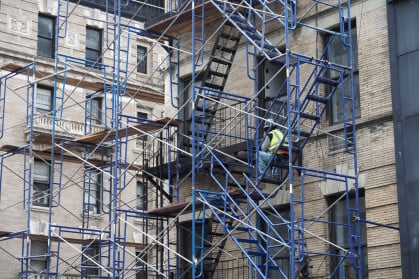
What questions are illegal to ask a buyer during a board interview?
When interviewing a prospective buyer, it's illegal to ask anything that falls under federal anti-discrimination laws and protected categories as defined under New York City laws.
For instance, your board can’t turn someone down from buying into a co-op because they think they’re too young or not a citizen of the United States. And the law goes even further.
“You're not allowed to ask any questions that would lead up to the information on which that kind of discrimination could be based,” says Howard Schechter, a real estate lawyer at the Manhattan- based law firm Armstrong Teasdale.
What kinds of questions are considered discriminatory?
Any question that asks a buyer about their race, ethnicity, national origin, sexual orientation or gender is considered discriminatory and prohibited under the Fair Housing Act. Board members also can’t ask personal questions about a buyer's marital status, whether they have a disability, and if they have children.
“You can’t ask things you wouldn’t ask a stranger on the street, essentially,” said Jonharold Cicero, a real estate attorney at DL Partners in Manhattan. If a buyer mentions that they have kids, that’s okay. However, your board shouldn’t ask further questions about them or any other information about their family.
The New York City Human Rights Law is part of the Administrative Code of the City of New York and prohibits discrimination in the five boroughs in situations regarding housing, employment, and public accommodations.
Classes that are protected under the law are age, immigration or citizenship status, color, disability, gender (including sexual harassment), gender identity, marital status and partnership status, national origin, pregnancy and lactation accommodations, race, religion/creed, sexual orientation, and status as a veteran or active military service member.
Additional protected classes under the law in housing include lawful occupation, lawful source of income, the presence of children, and status as a victim of domestic violence, stalking, and sex offenses.
Reasonable accommodation in housing, which means an adjustment or modification to an apartment in order to accommodate a disability (for example, waiving a “no pets” policy to allow a building resident to have a service dog), also falls under the Human Rights Law. In a board interview, a member is not permitted to inquire whether a potential resident would need a reasonable accommodation.
What are some examples of illegal interview questions?
● "Where were you born? Are you a U.S. citizen?"
● "Where do your children go to school?"
● "Do you and your significant other plan to host events or dinners during any particular religious holidays?"
● "Do you expect to have overnight guests?"
● "What gender do you (or your children) identify as?"
● “That’s a beautiful lilt in your voice, are you from Ireland?”
● “You’re such a lovely young couple, are you married? Are you planning to have
children?”
● “Do you belong to St. Agnes around the corner?”
● “Mr. Johnson, isn’t this one-bedroom apartment too small for Mr. Smith and you? Where will you both sleep?
● “This is a no-pet building. You don’t have a service animal, do you?”
What happens if a prohibited question is asked and the buyer is rejected?
If a question is asked during a board interview that runs afoul of the law and the buyer is rejected, the buyer might decide to sue your board under New York City’s Human Rights Law. However, the burden is on buyer to prove that your board was discriminatory when making its decision, and that can be difficult.
“Unless someone came right out and said, ‘We don’t want your kind in our building,’ it’s a tough thing to bring,” Cicero says, noting that he doesn’t see many complaints being brought to co-op boards these days. “I think boards are now a lot more conscious about the parameters of questions.”
To ensure that you don’t inadvertently ask prohibited questions, Schechter recommends that your board be prepared with at least an outline of what you plan to discuss and stick to it.
“It might be a perfectly normal conversation you would have in a different context, but you really sort of have to think about what’s being asked,” says Schechter. “It’s very easy to accidentally go off script and ask the wrong question.”
Sign Up for our Boards & Buildings Newsletter (Coming Soon!)
Thank you for your interest in our newsletter. You have been successfully added to our mailing list and will receive it when it becomes available.




















